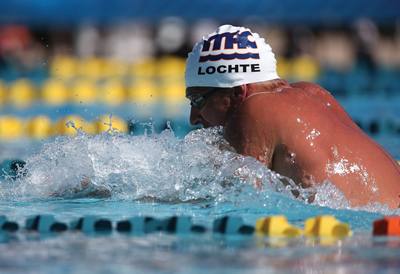 |
Olympic hotbeds like Charlotte, with swimmer Ryan Lochte, will be profiled in the campaign.
Photo by: GETTY IMAGES |
The U.S. Olympic team in Rio will include nearly 550 athletes representing a nation of more than 320 million people. Marketing such a vast entity takes big money, but the U.S. Olympic Committee is still a small outfit by modern sports spending standards.
So this year, the USOC is playing small ball. It’s preparing a local marketing campaign in cities that play an outsized role in the American Olympic movement, relying on precise digital audience-targeting tools and its own social networks.
Called “Hometowns,” the campaign includes online ads aimed at residents of the selected regions and specific sport fan groups, along with a series of short digital documentaries about seven cities’ connection to the Olympics.
The strategy is an attempt to tackle the challenges of marketing Team USA as a singular brand, said Chief Marketing Officer Lisa Baird, including the lack of a season. She hopes the USOC can extend consumers’ attention span by promoting the training and preparation for Rio instead of just the competition.
More importantly, it’s cost-effective. That’s crucial for the USOC, which traditionally has counted on deep-pocketed corporate sponsors to build hype for the Games but recently has tried to do more internally as its sponsorship revenue grows.
The USOC declined to disclose the cost of the campaigns.
In a December interview, as the Hometowns concept was being developed, Baird said an answer might lie in framing Team USA as a collection of regionally relevant sports programs, rather than a massive entity like the NFL or NBA.
“If you can’t compete at the national level or the global level, like those guys are doing, do we start to really break through at the local level?” Baird said. “We’ve gone from no exposure to a little exposure continuously, and I’m seeing results from that. But I don’t have a huge marketing budget, or a season, or the $200 million Steph Curry deal.”
The first completed series of documentary shorts features Princeton, N.J., home of USA Rowing, said Brian Gordon, managing director of marketing and USOC Productions. Co-produced with Olympic rights holder NBC, the three videos document local residents who host rowers while they train; athletes who become part of the community through day jobs; and the history of how Princeton became so closely aligned with rowing in the first place.
Six more regions will be featured: Iowa City (wrestling); Charlotte (swimming); southern California (beach volleyball); Homewood, Ala. (Paralympics); Huntsville, Texas (women’s gymnastics); and Colorado Springs (men’s gymnastics, but also home to the USOC and an Olympic Training Center).
NBC is acting as the production company for the USOC-developed digital shorts, a first in the network’s long history as an Olympics partner. Mark Levy, senior vice president of original productions and creative, and Joe Gesue, senior vice president of production for the Olympics, are leading the project for NBC.
“We were basically going to do the pilot for the program, and potentially have another production company do the other five or six,” Levy said. “But Brian [Gordon] and I looked at each other and said, why don’t we continue to produce these? We really like the quality and like what we’ve done, and we both see great potential here, because we can turn and spread the content as well.”
NBC will look for opportunities to repurpose the documentaries in its own digital and TV coverage of the Games, Levy said, but the videos will be distributed first through the USOC’s social channels.
On the paid media side, the USOC is using Facebook, Twitter and networks of local news sites to reach fans. Facebook, in particular, allows ad buyers to buy against extremely specific users, including those who have liked individual athletes or sports governing bodies.
“The strategy is, let’s build a groundswell from town to town, because of who our Olympians are and who we are, versus blowing it out across the country, which doesn’t make sense right now,” Gordon said. “It’s a shift. Everyone loves Team USA, but let’s engage on a very, very micro level, where someone can reach out and support and touch and feel an Olympic athlete in their hometown.”
The local concept is not entirely new. NBC broadcasts have routinely mentioned the hometowns of athletes while featuring their backstories, and sponsors have long sought to create personal connections between athletes and fans. In 2014, NBC launched a feature that told viewers how to contact nearby training centers if they wanted to enroll their children, and in 2012 USOC sponsor Samsung attempted a controversial initiative that utilized a Facebook app that allowed users to see how they were connected to athletes.
But, Gordon said, the 2016 Hometowns concept will become a permanent fixture in USOC strategy as the Olympics head into a stretch in which three straight Games will be held in east Asia from 2018 through 2022. Officials hope the local campaigns will keep the Games relevant despite that geographic challenge.
Glimpses of the strategy are already in place. The USOC’s “Road to Rio” experiential marketing campaign has led with local flavor, and the December Team USA Awards show in Philadelphia featured famous Olympians from southeastern Pennsylvania.




